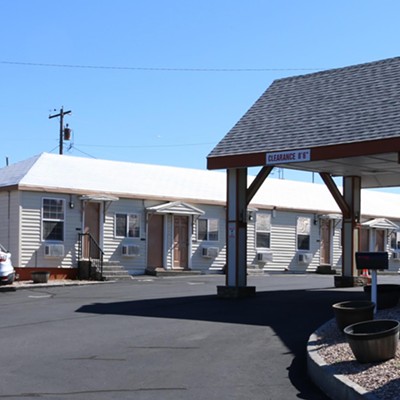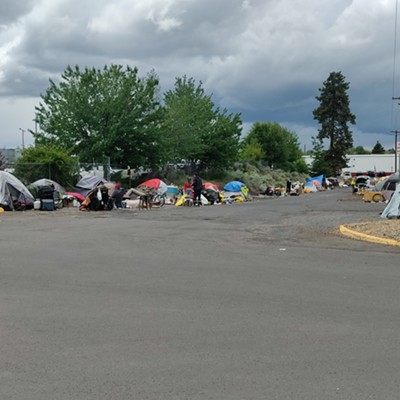After months of lengthy meetings, the Vacation Home Rental Task Force has drafted land use recommendations for consideration by the Planning Commission and City Council. But even if the City adopts the proposed changes, it's not likely to change the landscape of the westside neighborhoods on the frontlines of the issue.
"The recommendation is for the status quo," says westside resident Monty Payne. "We're being railroaded."
They key recommendations in the Task Force's draft code amendments pertain to the number of vacation rentals allowed both within a particular neighborhood and within a specific radius of existing short-term rentals. There is some debate about the details.
Though the 23-member Task Force was able to reach consensus on most of its recommendations, there were a few sticking points. As a result, it offers two options for limiting the concentration of vacation rentals in residential neighborhoods. The first would allow only 5 to 10 percent of tax lots in a 250-foot radius to be short-term rentals. The second option, intended to prevent clustering, would permit just one such rental in a 250-foot radius, and 5 to 10 percent of the lots within a quarter-mile radius to also be vacation rentals.
But regardless of the particular number or ratio of rentals permitted within a given radius, neither approach would provide relief for those neighborhoods most affected. According to Task Force member Spencer Dahl, the City's numbers show the highest concentrations of vacation rentals in the Old Bend and River West neighborhoods, with 14.6 percent and 7 percent, respectively. But even if the City capped short-term rentals at 5 percent, it wouldn't apply to these neighborhoods.
That's because the prevailing school of thought dictates that Oregon land use law prevents the City from retroactively applying new vacation rental regulations to currently permitted properties. The argument is that such restrictions would reduce the value of the properties and constitute a "taking."
"The other critical issue is property rights," writes Becky Ozrelic, a long-term rental owner in Bend, in testimony submitted to the City. "People who own homes that currently have no restrictions on [vacation rentals] have the right to use their home as a personal residence, a long-term rental, a vacation rental, or any other use that is not illegal. To retroactively abridge those rights is wrong and un-American."
But while retroactive regulation would likely spawn lawsuits, some say legal precedent supports the right of municipalities to enact land use restrictions to advance government interests. The 1993 Oregon Supreme Court case Cope v. City of Cannon Beach tackled the question of vacation rental restrictions and ruled in favor of the city.
In its decision, the court wrote Cannon Beach's ordinance restricting vacation rentals from residential neighborhoods "substantially advances governmental interests" and noted that the U.S. Supreme Court "has recognized, in a number of settings, that States and cities may enact land-use restrictions or controls to enhance the quality of life by preserving the character and desirable aesthetic features of a city."
However, this case was heard before Oregon passed a series of land use measures in 2004 and 2007—Measure 37 and Measure 49. As a result of these measures, Oregon law states, "If a public entity enacts one or more land use regulations that restrict the residential use of private real property or a farming or forest practice and that reduce the fair market value of the property, then the owner of the property shall be entitled to just compensation from the public entity that enacted the land use regulation or regulations."
Since short-term rental of a property can be considerably more profitable than long-term rental, restricting short-term rentals could be seen as a reduction of property value entitling the owner to compensation or other relief.
Short of a legal challenge, the only hope on the horizon for reducing the concentration of vacation rentals in heavily impacted neighborhoods are a proposed annual licensing program and abandonment provisions. Under the proposed program, short-term rental owners could lose their permit if they failed to reapply and pass any pertinent inspections or if the property went unrented for 12 months or more.
But these measures offer little solace for neighbors, many of who are battle-worn and weary—westside resident Monte Payne says he feels as if he's "under siege." Some say if they don't see some relief, they may just leave.
"It is kind of a gold rush," says Justyn Livingston, in response to the rush to obtain permits before new regulations set in. "But I'm thinking about applying for one, just so I have options. Last summer I thought, I don't want to live here anymore."
But Dr. Chris Friess, a Vacation Rental Task Force member who favors stricter restrictions on the rentals, says he trusts the Planning Commission to hear the community's concerns and recognize the divergent interests represented on the task force. He doesn't think retroactive regulations, or a gradual phase out, are dead in the water.
"I think the Planning Commission gets this was not a democratically elected group," Friess says. "The draft proposals don't do much to turn back what we have now."
The Planning Commission will consider the draft code amendments at its February 23 meeting.



























